‘We don’t disappear after 30’: the Old Lesbians telling a century’s worth of raw, revealing stories
Featuring more than 900 candid interviews, the Old Lesbian Oral Herstory Project seeks visibility for those long denied it.
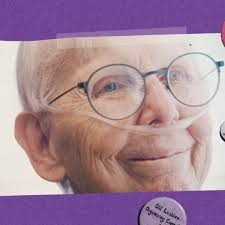
Two women who met as teenagers, fell in love, and stayed together for 69 years – spending all but the last decade of their relationship in the closet. A woman who, in her 70s, finally decided to come out to two friendly lesbian strangers she saw together at the grocery store. One woman, born in 1918, who found herself in a lesbian bar one day, not knowing such a thing existed, and finally felt at home.
These are all stories pulled from the Old Lesbian Oral Herstory Project (OLOHP), a catalogue of more than 900 interviews with lesbian seniors in the US. Arden Eversmeyer, a retired Houston schoolteacher who devoted her retired years to campaigning for visibility for older lesbians, who she felt were missing from the cultural discussion, began interviewing women in 1998.
She grew a team of interviewers – all of them also old lesbians, as they call themselves – to travel around the country speaking to women. These transcripts, audio recordings, and photos of the subjects live in an archive at Smith College in Northampton, Massachusetts. After Eversmeyer’s death at age 91 in November 2022, a dedicated group of friends and fellow activists took up the cause. Last month Meghan McDonough, a Brooklyn-based film-maker, released a documentary called Old Lesbians telling the story of OLOHP, commissioned by Guardian Documentaries.
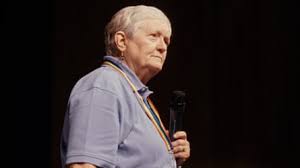
Eversmeyer and her team recruited interview subjects through a word-of-mouth network, and by placing ads at venues such as women’s music festivals or the free magazine Lesbian Connection. The only requirement was that the woman be over 70 years old and identify as a lesbian – she didn’t have to be out publicly, and could remain anonymous. (The age requirement has since been loosened.)
“Arden’s famous quote is, ‘You don’t have to climb Mount Everest to have an interesting life story, because the fact that you are a lesbian in our culture makes your life story interesting,’” said Barb Kucharczyk, an air force veteran and OLOHP interviewer who served more than two decades in the military, including under the discriminatory “don’t ask, don’t tell” policy.
Interviews are conducted loosely and conversationally. Not every question relates to a woman’s sexuality. There are a few standard questions: Where were you born? What did your family look like? What did your folks do for a living? But the point is mostly to make women feel comfortable and open up.
“We’ve tried to make it as gentle of an experience as we can for the women,” said Kucharczyk, who is 76 and lives in Sumter, South Carolina. “It becomes a chronological discussion of their life story. At some point in time, they will talk about being a lesbian. But we don’t walk into the door with 47 questions about how they found out they were, or how they were treated. We want the woman to tell her own story, and if the details about her lesbian lifestyle are slim, that’s OK.”
Still, the project is a raw and revealing look at what life was like for lesbians in the 20th century. Women who came of age before Stonewall and the sexual revolution describe what Kucharczyk calls “hidden lifestyles” that they kept secret, living in fear for their safety. There are harrowing descriptions of conversion therapy, ostracism and physical attacks.
Ethyl “Ricci Cortez” Bronson, an exotic dancer and member of the Burlesque Hall of Fame, who later opened the first “gay girls’ bar” in Houston, told Eversmeyer during an interview that took place shortly before Bronson’s death in 2008 that her club was regularly raided by cops. “A lot of the girls in slacks and pants had been hauled off to jail in the raids,” she said. “They even put me in handcuffs and carried me out to the police car. In my own bar! This is what we went through to get open bars, open gay bars.”
Some of the women interviewed for the project asked to speak anonymously, or on certain conditions, like that their name only be revealed after they died. This did not affect their candour when speaking on the record. “Women were open with us as long as they knew that this was not going to be published,” said Edie Daly, an 87-year-old retired intensive care nurse who splits her time between Florida and Massachusetts. “Some of these stories are still closed, because even though they have passed, they were in fear of outing themselves or someone else.”
Daly said some women were able to break through their hesitancy because they wanted to leave a record of what had happened to them. “We talk about how we would love to know what the suffragists’ individual stories were, and we don’t have that, because a lot of women’s stories are lost,” she said. “Women have been erased from history, and so this is our attempt to rectify that in some small way.”
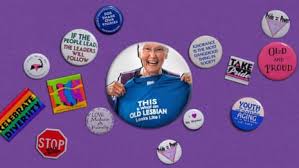
Lillian Faderman, an award-winning scholar of lesbian history and professor emeritus at Fresno State in California, sat for her own interview with Eversmeyer. When she came out in 1950s Los Angeles, she used fake IDs to get into what were then called “gay girls’ bars”.
“As a young lesbian, my feeling was that what happened when you reach 30 or older was that you probably died,” Faderman said. “There were simply no role models, and I don’t think it’s quite as bad today because of social media, but for the most part, I think that young lesbians still have no notion that we don’t disappear after 30. I think it’s important for them to understand that they have a future outside of youth.”
Faderman hopes that the interviews “send a message to the people in our community for posterity, that we are here and flourishing”.
“We’ve always been here,” Daly added. “But now we have visibility, and a voice. And it’s not just visibility of old lesbians, it’s the visibility of all strong women.”
This June, another Pride month unfurls over the backdrop of attacks on LGBT+ Americans. The FBI has warned that celebrations could be targeted by terrorists, and Target rolled back its Pride merchandise after last year saw conservative backlash that in some instances led to angry shoppers confronting workers. That’s partly why Kucharczyk believes it’s more important than ever to look toward the past.
“Does history repeat itself? Absolutely,” Kucharczyk said. “You’re watching it happen right here, right now. I hope the message that young folks take away is to be aware of this history, because if you’re aware, you can see the tidal wave that’s coming up.”
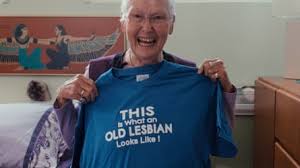

6 Major Social Media Platforms Fail LGBT+ Users

The six largest social media platforms received abysmal grades for LGBT+ safety, privacy, and expression and failed to protect LGBT+ users from hate speech and harassment, according to the Gay & Lesbian Alliance Against Defamation (GLAAD).
Five of them – YouTube, X/Twitter, and Meta’s Facebook, Instagram, and Threads – received F grades for the third consecutive year.
TikTok was the only platform to improve, going from an F to a D+, according to the 2024 Social Media Safety Index report.
“Leaders of social media companies are failing at their responsibility to make safe products. When it comes to anti-LGBTQ hate and disinformation, the industry is dangerously lacking on enforcement of current policies,” GLAAD president and CEO Sarah Kate Ellis said in a press release. “There is a direct relationship between online harms and the hundreds of anti-LGBTQ legislative attacks, rising rates of real-world anti-LGBTQ violence and threats of violence, that social media platforms are responsible for and should act with urgency to address.”
Findings from the report:
- Anti-LGBT+ rhetoric and disinformation on social media translates to real-world offline harms.
- Platforms are largely failing to successfully mitigate dangerous anti-LGBT+ hate and disinformation and frequently do not adequately enforce their own policies regarding such content.
- Platforms disproportionately suppress LGBT+ content.
- Lack of effective, meaningful transparency reporting from social media companies with regard to content moderation, algorithms, data protection, and data privacy practices.
The report makes note of high-follower hate accounts and right-wing figures who continue to manufacture and circulate most of this activity.
The report cites more than 700 incidents of anti-LGBT+ hate and extremism documented between November 2022 and November 2023, including homicides, assaults, bomb threats, and acts of vandalism.
GLAAD makes five recommendations to improve social media platforms for LGBT+ users:
- Strengthen and enforce existing policies
- Improve moderation
- Be transparent
- Stop violating privacy / respect data privacy
- Promote civil discourse.

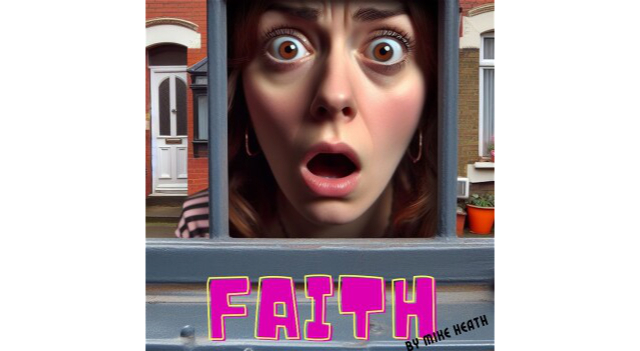
Faith, by Mike Heath
Greater Manchester Fringe performances at HOME Studio, 2 Tony Wilson Place, Manchester M15 4FN
Monday 1 July to Wednesday 3 July, 6.00pm – 7.30pm
Tickets £15 / £13 concessions (+ booking fees)
Inviting your mother to your wedding should be a joyous occasion; unless you’re gay and your mother is a staunch Catholic.
Such is the dilemma for John, as he arrives at Faith’s little terrace on a Tuesday evening, only to discover she has tried to match-make him with Melanie – a no-filter 40-something singleton from the church, convinced that tonight is the night.
Of course, tonight is absolutely not the night as the veil is unceremoniously lifted on the patina of John and Faith’s fabricated reality.
Then, when Faith is shocked to death by Melanie’s unwitting fictions of gay men’s bedroom behaviours, she discovers the church has it all wrong about homosexuality and alternative lifestyles while she queues for judgment at the pearly gates.
Sent back to right the wrongs of her earthly existence, she gets a second chance to fix her broken relationship with John (and convince the Pope he was wrong all along).
Buy tickets here.

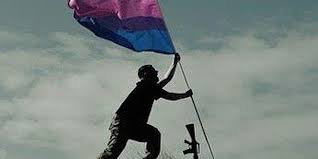
Live@TheLibrary: Bi-Topia
Oldham Library & Lifelong Learning Centre, Greaves Street, Oldham OL1 1AL
Thursday, 18 July – 7.00pm – 8.30 pm
Tickets are £6.00. Buy tickets here.
A comedic, touching and candid piece of new writing by northern theatre maker Sam Danson.
BI-TOPIA is a joyful, chaotic and honest coming-of-age story, exploring the authentic Bisexual experience, bravely delving into under-represented links between poor mental health, sexuality and masculinity.
A comedic, touching and candid piece of new writing by northern theatre maker Sam Danson.
Contains some adult references, strong language, mental health, mention of suicide, violence and themes of a sexual nature. Recommended age 14+.

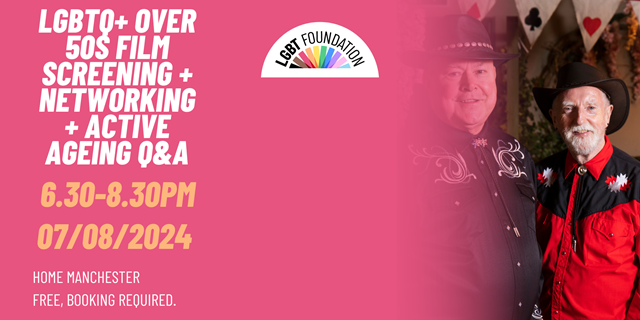
Pride in Ageing Event
LGBT Foundation’s Pride in Ageing programme invites you to a special summer get-together and evening of celebration of our LGBTQ+ over 50s communities in Greater Manchester.
Come along and find out more about their work with older communities, how you can get involved and how they can support you.
This relaxed event will include short film screenings, LGBT Foundation stalls, networking and a live video-link Q&A where you can ask the experts your questions on HIV, sexual health and active ageing for LGBTQ+ communities.
Details of the full line-up:
- An introduction to LGBT Foundation’s work with older LGBTQ+ communities and how you can get involved, hosted by Lawrie Roberts, Pride in Ageing Manager
- Stop HIV – Active Ageing discussion with drag queen Daisy Puller and Dr Laura Waters + Live Video Link Q&A presented by dkbmed and supported by an educational grant from Gilead Sciences Inc
- The beginnings of Manchester Pride in the 1990s – footage from Tickled Pink and Manchester Mardi Gras (presented with thanks to North West Film Archive)
- LGBT Foundation information stalls
Free tickets for this event can be booked here.
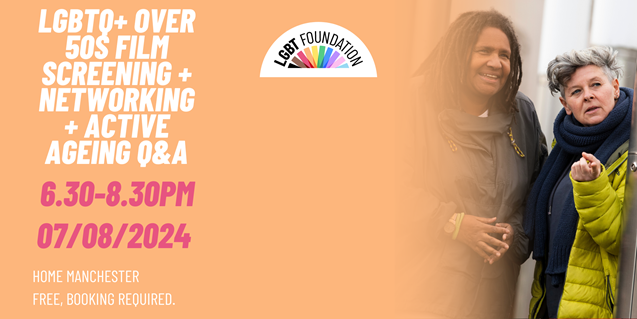
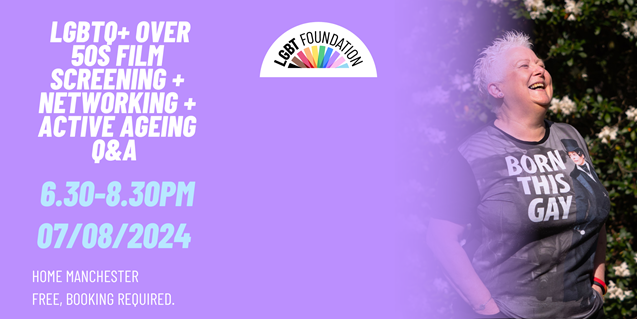

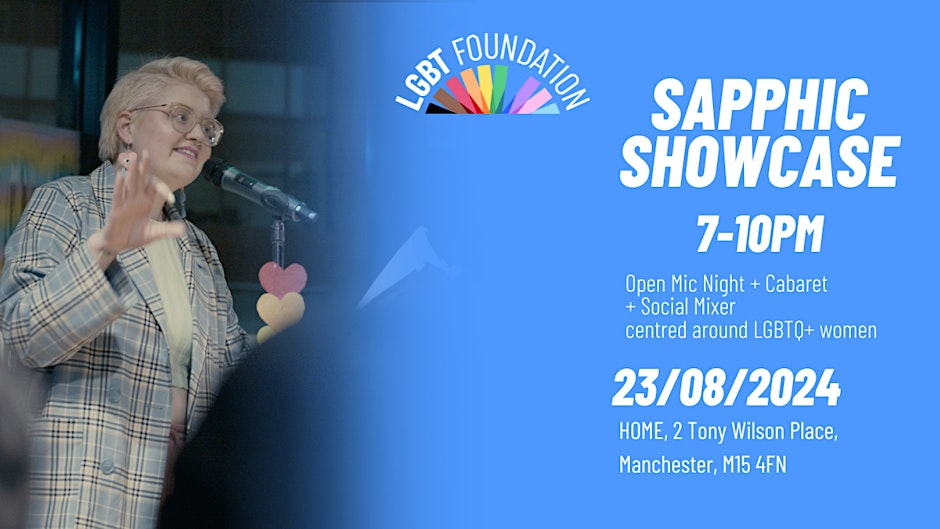
Sapphic Showcase: Pride Cabaret + Open Mic Night + Social Mixer
Join us for a night of talent from amazing LGBTQ+ women – including you! – and a great opportunity to socialise to kick off Manchester Pride
Friday, 23 August 2024 – 7.00pm – 10:00pm
HOME, 2 Tony Wilson Place, Manchester M15 4FN
Book FREE tickets here.
LGBT Foundation are bringing together some fantastic headliners to entertain you and are inviting YOU to perform in one of the open mic night slots.
We’re so excited to see all the amazing Sapphic talent Greater Manchester has to offer from poetry, to comedy, and music! After these amazing performances, stick around for some opportunities to socialise and meet some people before Manchester Pride. Please note: Headliners will be announced in July.
Open mic slots are available for any LGBTQ women and non-binary people who wish to access a women centred event. The event will be LGBTQ women centred but the audience is open to all.
